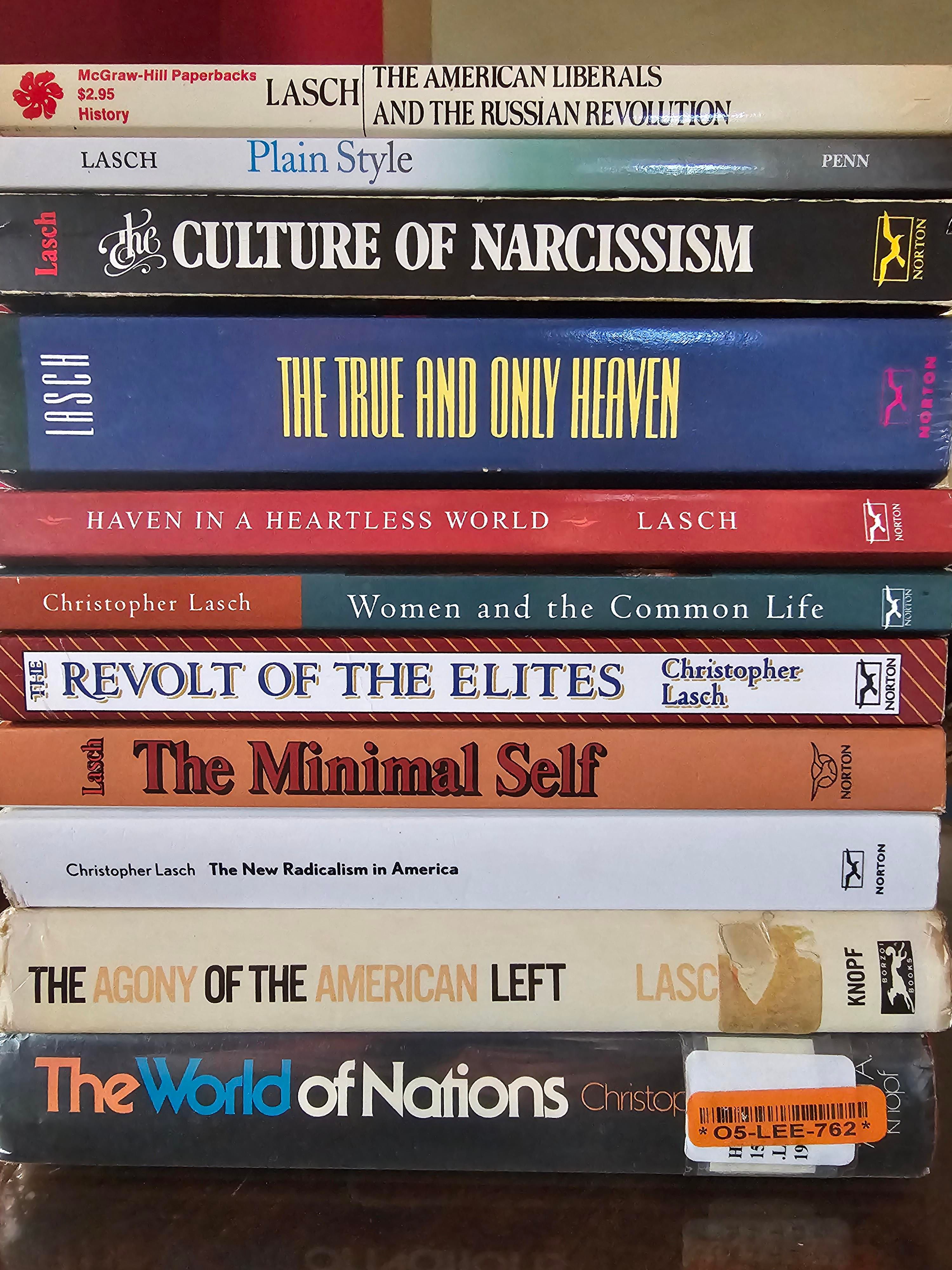
I Miss Christopher Lasch
The Democratic Malaise: Christopher Lasch and the Betrayal of Democracy
The Democratic Malaise: Christopher Lasch and the Betrayal of Democracy
In an era defined by profound disquiet—marked by surging populism, widening economic chasms, and a palpable sense of cultural fragmentation—the insights of American historian and social critic Christopher Lasch resonate with an almost prophetic clarity. From his incisive critique of unchecked progress in The True and Only Heaven to his stark diagnosis of elite detachment in The Revolt of the Elites and the Betrayal of Democracy, Lasch offers not just a historical account, but a powerful explanatory framework for understanding the profound malaise afflicting Western democracies today. He delineates a through-line, demonstrating how the very forces championed as drivers of modernity have inadvertently hollowed out the foundations of genuine self-governance.
 Key works by Christopher Lasch that remain essential reading for understanding today's democratic crisis
Key works by Christopher Lasch that remain essential reading for understanding today's democratic crisis
The Illusion of Progress and the Erosion of Limits
Lasch's intellectual journey began with a profound skepticism toward the prevailing ideology of "progress." In The True and Only Heaven: Progress and Its Critics, he argued that the relentless pursuit of material accumulation and the belief in humanity's boundless capacity to master nature had come at a steep cost.
This uncritical faith in progress, he contended, undermined traditional virtues like:
- Civic responsibility
- Self-restraint
- Recognition of human limitations
Both the political left and right, in their own ways, became complicit in this narrative, failing to champion a robust sense of public spiritedness over the insatiable demands of consumerism and economic expansion.
Lasch saw the decline of vibrant local communities and the rise of a centralized, bureaucratic state as directly linked to this ethos of progress. As institutions increasingly assumed functions once held by families and neighborhoods, individuals were progressively infantilized, their capacity for self-reliance and collective action diminished.
This paved the way for a "culture of narcissism," where:
- Self-absorption replaced civic engagement
- Personal gratification overshadowed commitment to the common good
- The "American dream" transformed from shared participation into shallow materialism
The Revolt, and Betrayal, of the Elites
While The True and Only Heaven laid the philosophical groundwork, The Revolt of the Elites and the Betrayal of Democracy offered a searing indictment of the class he believed was actively undermining democratic principles: the educated, affluent upper-echelon of society. Lasch inverted Ortega y Gasset's famous thesis, arguing that the true threat to democracy came not from the "revolt of the masses" but from the "revolt of the elites."
These new elites, largely drawn from the top 20% of income earners, were characterized by:
- Rootlessness and detachment from place
- Globalized, cosmopolitan identity over national belonging
- Marked disinterest in the fate of their own nations
Lasch famously described them as "tourists in their own countries," their allegiances often more global than local. They segregated themselves in "voluntary ghettos" of wealth and privilege—exclusive neighborhoods, private schools, private healthcare—effectively withdrawing from the shared institutions and common life that bind a democratic society.
This detachment had profound consequences:
Degradation of Public Discourse: Lasch observed that elites increasingly controlled the terms of public debate, narrowing it to issues relevant to their own class while dismissing the legitimate concerns of ordinary citizens. Informed deliberation gave way to ideological posturing and facile name-calling.
Erosion of Shared Standards: The ascendancy of a "meritocracy," which Lasch saw as a "parody of democracy," replaced a belief in general competence and shared civic responsibility with an emphasis on specialized expertise and individual professional advancement. This fostered a contempt for manual labor and a widening gap between the "thinking classes" and the working class.
Spiritual and Moral Decay: Having jettisoned traditional moral and ethical guidelines, often under the guise of scientific progress or "liberation," these elites cultivated a culture of cynicism, detached from any sense of collective purpose or shared destiny.
The "betrayal of democracy," in Lasch's view, was multifaceted:
- Abandonment of public institutions
- Intellectual disdain for the common person
- Prioritization of private advantage over public good
- Systemic hollowing out of civic infrastructure necessary for functioning democracy
Connecting to Our Current Crisis
Lasch's analysis, written decades ago, feels acutely relevant to our present moment of crisis.
Political Polarization and Populism: The rise of populist movements across the Western world, from the election of Donald Trump to Brexit and the ascent of far-right parties in Europe, can be seen as a direct consequence of the elite detachment Lasch described. Large segments of the population feel "left behind" and unrepresented by traditional political establishments, leading them to embrace figures who articulate grievances against "the elites." The often-vituperative nature of contemporary political discourse, where nuance is lost to ideological purity tests and mutual condemnation, directly echoes Lasch's concern about the degradation of public debate.
Economic Inequality and Social Fragmentation: The widening gap between the rich and the rest, a defining feature of the 21st century, exacerbates the sense of elite detachment. Billionaires who fund private space ventures while public infrastructure crumbles, or tech magnates who advocate for "disruption" while workers face precarity, embody the "secession of the successful." This economic stratification reinforces cultural fragmentation, as different socio-economic groups increasingly inhabit distinct realities, with limited shared experiences or common institutions.
Erosion of Trust in Institutions: From mainstream media to government bodies and academic institutions, trust is at an all-time low. Lasch would argue that this is not merely a failure of communication, but a symptom of the elite's withdrawal and their perceived indifference to the concerns of the broader public. When elites are seen as self-serving and detached, the institutions they lead are inevitably viewed with suspicion. The "meritocracy" he critiqued has led to a perceived lack of accountability and an alienation from traditional pathways to social mobility for many.
Cultural Wars and Identity Politics: While Lasch was critical of identity politics when it devolved into moralistic self-indulgence (as he explored in The Culture of Narcissism), his broader critique of a fragmented public sphere provides context for the intensity of today's cultural wars. Without shared civic values or a common cultural ground, society risks dissolving into warring factions, each retreating into its own "lifestyle enclave" or ideological bubble, precisely as Lasch feared.
Lasch's Explanatory Framework
Christopher Lasch provides a powerful through-line to our current democratic malaise by shifting the focus from the failures of the "masses" to the failures of the "elites." He argues that the uncritical embrace of "progress" and the subsequent detachment of the educated and wealthy have systematically weakened the democratic fabric.
His work suggests that the current crisis is not a sudden aberration but the culmination of long-term trends:
- The erosion of civic virtue
- The decline of shared public life
- The intellectual and moral capitulation of those entrusted with democratic stewardship
He compels us to confront uncomfortable truths: that a healthy democracy requires not just formal institutions, but:
- A robust civic culture
- A commitment to common standards
- A recognition of limits
- Mutual obligation between all citizens, regardless of class
For Lasch, the democratic project demands humility, self-restraint, and a rootedness in shared experience—qualities that he argued have been systematically undermined by the very forces that define modern elite culture.
His legacy forces us to ask whether our elites, by their actions and their worldview, have indeed betrayed democracy, and whether a renewal of democratic life can only emerge from a radical re-engagement with the common good.